Pinworms in Babies

Children, in their developmental stages, frequently encounter various illnesses. Among these, infections from pinworms in toddlers and babies are notably prevalent, albeit easily treatable. The intestinal parasite responsible for this condition is referred to as pinworms, threadworms, or seatworms. These parasites can affect individuals of all ages, yet the infection typically resolves swiftly with appropriate treatment. Nonetheless, vigilance and prompt intervention remain crucial in managing such common childhood ailments to ensure the well-being and health of young individuals as they navigate their formative years. Furthermore, educating parents and caregivers about the symptoms and transmission of pinworms can empower them to take proactive measures to protect their children’s health.
What Are Pinworms?
To break it down for you, in pinworm infections, pinworms are small white-coloured worms that can range in length from 2mm to 13mm long. They look very similar to dental floss or very thin white cotton thread (hence called threadworms). They are highly contagious through direct contact with objects or persons that are contaminated with either the worms or its eggs.
Can Infants Get Pinworms?
Certainly, pinworm infections can affect babies, although it’s relatively uncommon. Infants who haven’t started crawling, consuming solid foods, or drinking water face minimal risk of ingesting pinworms and their eggs, thus reducing the likelihood of contracting any illness. In rare instances, there’s a possibility of inhaling the eggs of these worms. Typically, infants maintain a hygienic anal area as caregivers regularly wipe their anus during diaper changes with baby wipes. Consequently, the likelihood of infection is diminished. However, once your baby begins to crawl, eat solid foods, or drink water, the risk of contracting pinworms increases.
How Does Pinworm Infection Spread?
Once your child has been infected, the female worms get right to work while your baby is sound asleep. The worms enter the intestinal tract, latch onto the skin surrounding the colon and around the rectum and lay eggs.
The eggs of pinworms can survive outside the human body for up to three weeks. It is hence very easy for a healthy person to catch the infection if someone in the family has it. Extreme measures need to be adopted to prevent this: while a quarantine may not be possible, it is strongly advised to not share and touch any belongings of the person who has a pinworm infection. Also, make sure you wash your hands thoroughly, with a strong antiseptic soap, after you are done tending to the affected person.
Causes of Pinworm in Infants
Infants will easily catch a pinworm infection if an adult in the same household has also got it. Here’s how it might happen:
- Being in direct contact with any contaminated object.
- Ingesting food that may be contaminated.
- Breathing in the eggs that might be latched onto clothes or sheets. This can happen when the infected item is being shaken.
- Itching, especially around the anal region, could cause your child to pick up pinworm eggs through their fingernails.
Symptoms of Pinworm in Babies
Parents, if you’re doubtful that your baby has contracted pinworms, look out for these signs and symptoms.
- Disturbed sleep and fussiness caused due to itching around the anal region.
- Bacterial infection increases the chances of pinworms due to excessive itching that causes skin breakage around the anal region.
- In girls, pinworms can affect the vagina causing vaginal itching and/or discharge.
- In some cases, excessive pinworm infection in the intestine can lead to nausea and vomiting. Pinworms can cause nausea and vomiting in rare cases.
- The chance of appendicitis, which is extremely rare, could occur due to the blockage of the appendix by pinworms.
If you notice any other severe symptoms, consult your child’s paediatrician immediately.
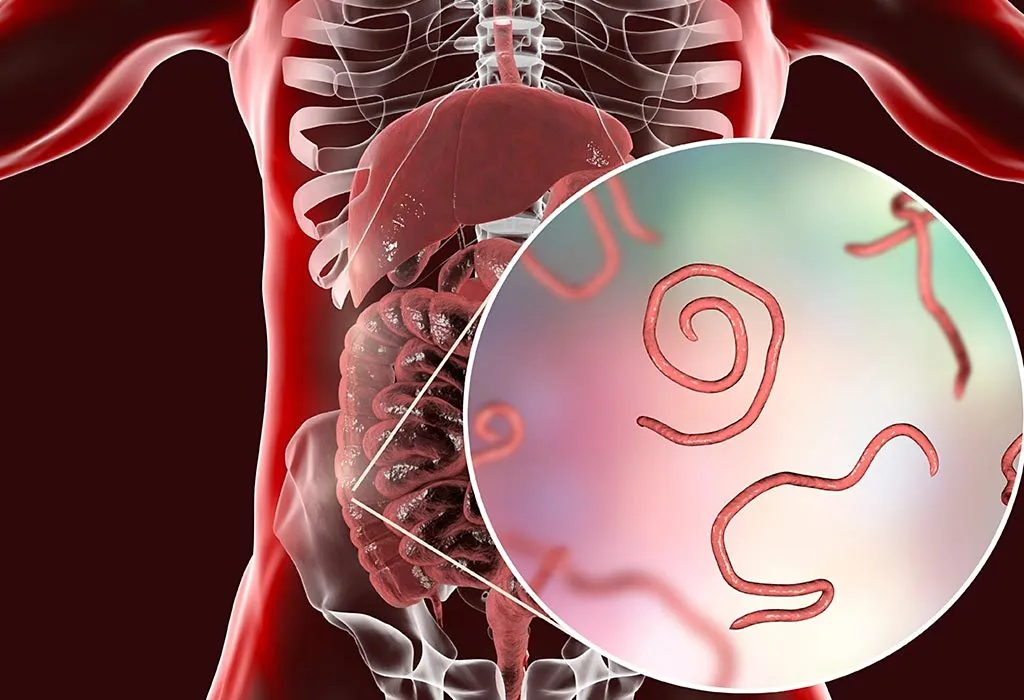
How Are Pinworms Diagnosed?
Here are some ways in which you can inspect your baby if you suspect a pinworm infection:
- Use a flashlight to check around the anal region. Since the worms lay eggs at night, checking in the morning is ideal.
- Checking the surface of your child’s faeces or the vaginal tip can prove helpful.
- Using transparent tape, gently press around the anus to see if your child has been infected. Since pinworms lay eggs around that region, it will be easy to identify the infection (1).
Pinworm Treatment for Babies
In the case of your child contracting Pinworms, you should look out for symptoms like itching and disturbed sleep. A serious infection can lead to severe problems, so getting it under control is the main priority.
The doctors will suggest the following procedures for your child and family just to be on the safer side. It is essential to follow them diligently.
- Drugs: Consumption of ‘over the counter’ medications like Mebendazole, Pyrantel or Albendazole to eliminate the pinworms is common. However, check with your paediatrician for a suitable dose (2).
- Repetition: Since the medication will kill pinworms in a week, the course must be repeated two weeks later to kill any pinworms that may have hatched from the eggs laid earlier (3).
Tips to Follow if Your Baby Has Pinworm
It is not always recommended to opt for allopathy to treat babies. Here are a few other things you can try:
- As instructed by the paediatrician, follow the medical treatment for your little one.
- Every morning, ensure your child is bathed as this will help in the removal of the eggs laid overnight.
- During a diaper change, ensure you wipe and clean your baby thoroughly every time.
- Keep your surroundings clean to prevent recurring infections. Cleaning the house and washing all clothes, sheets, and towels in hot water can kill Pinworms and their eggs.
- Disinfect your child’s toys with soap and hot water.
- Since pinworm eggs are sensitive to sunlight, ensure that all your curtains and blinds are drawn to bring in plenty of sunlight.
Effective Home Remedies for Pinworm in Babies
There are home remedies for pinworms in your toddler when they are infected that can help your little one. Just ensure to check for allergies before you can implement them.
- Garlic: Garlic has the potential to eliminate pinworms inside your baby’s intestinal tract.
- Grapefruit seed extract: is known to regulate bowel movements, aiding in properly flushing out the pinworms from your child’s system.
- Coconut oil: It has antibacterial and antiviral properties that are a good remedy to help with your child’s pinworm infection.
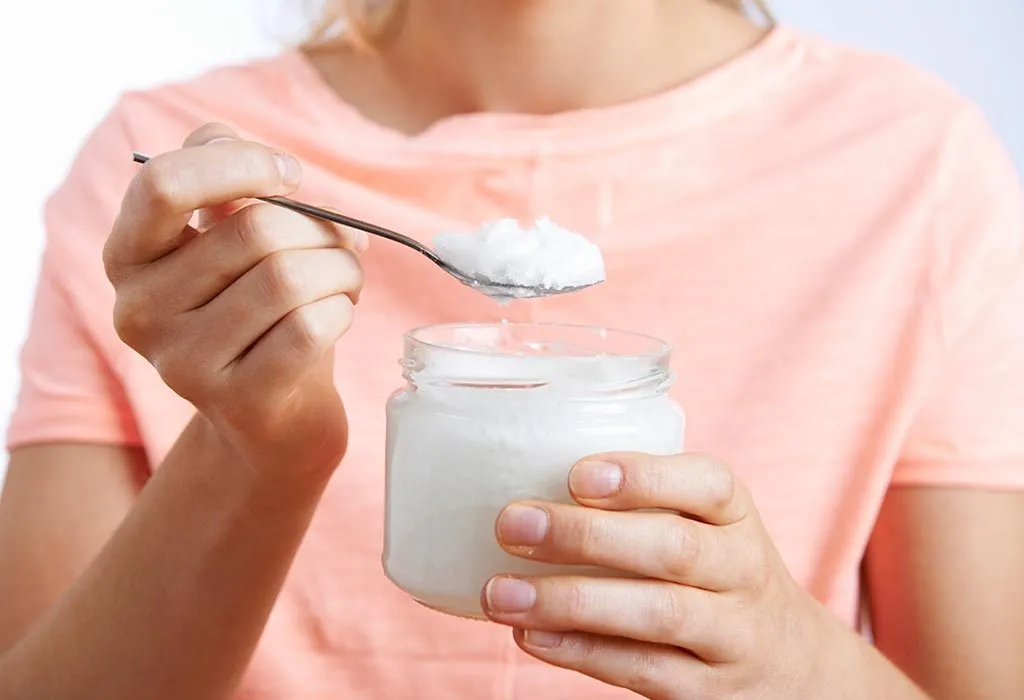
Pinworm Infection Follow-Up
Pinworm infections may recur. You may try home remedies, but it is also suggested that your child is properly dewormed and is taken for a checkup with their paediatrician.
What Happens if Pinworms in Babies Are Not Treated?
Since a pinworm infection is a serious one, especially in toddlers, it must be treated immediately. If not, they have repercussions such as the following:
- Itching and rashes around the anal region
- Vaginal itching and discharge
- Diarrhoea
- Bedwetting
How to Prevent Pinworm in Infants?
Following are the various ways in which pinworms in infants can be prevented (4).
- Cleanliness can help prevent pinworms. Keeping your child’s nails short and clean can do the trick.
- Bathing in the morning can help get rid of the eggs laid overnight.
- Keep track of your child’s diaper and underwear. Changing diapers at regular intervals and daily change of underwear is a must.
- Get plenty of sunlight into your child’s room and around the house. It helps eliminate pinworm eggs.
- Try and prevent your child from biting their nails or sucking their fingers.
- Keep your hands clean as Pinworms are a contagious infection. Wash your hands constantly.
- Ensure your child’s hands are washed before eating and after using the toilet.
- During the recovery period, ensure you wash all clothes, linens, and towels in hot water.
- Toilet seats must be cleaned daily to prevent the worsening of the pinworm infection.
- Ensure that your child is infection-free before they can interact with any other children.
FAQs
1. What is the right age to get babies dewormed?
The right age to deworm babies typically starts around 6 months old, as recommended by healthcare professionals. However, it’s essential to consult with a pediatrician to determine the specific timing and method of deworming suitable for your baby’s health and development.
2. Do babies have pinworms in their poop?
Yes, there can be pinworms in baby poop, but it’s relatively uncommon. Infants who are not yet crawling, eating solid foods, or drinking water have minimal risk of ingesting pinworms and their eggs, thus reducing the likelihood of finding them in their poop. However, in rare cases, pinworm eggs might be present in feces if the baby has been exposed to the infection.
3. Can certain foods cause pinworms in babies?
No, certain foods do not directly cause pinworm infections in babies. Pinworm infections occur when a person ingests pinworm eggs, typically through contaminated food, water, or surfaces. However, maintaining good hygiene practices, including proper food handling and handwashing, can help prevent the transmission of pinworms and other intestinal parasites.
4. What are the symptoms of pinworms in babies?
Common symptoms of pinworms in babies include itching around the anus, especially at night, irritability, restlessness during sleep, and sometimes visible worms in the stool or around the anal area. However, not all infected babies may show symptoms, making it essential to monitor for signs of infection.
5. How can I prevent pinworm infections in my baby?
To prevent pinworm infections in babies, encourage good hygiene practices such as regular handwashing, especially before meals and after using the restroom. Keep your baby’s fingernails short and clean to reduce the risk of transferring pinworm eggs from the anus to the mouth. Also, regularly wash bedding, clothing, and toys to prevent the spread of infection
There are many infections your child can pick up, and pinworms can cause a lot of discomfort in your child. It must be treated as the earliest with all the necessary precautions and remember prevention is always better than cure!
References/Resources:
1. Pinworms: Treatment and Prevention; Nationwide Children’s Hospital; https://www.nationwidechildrens.org/conditions/pinworms-treatment-and-prevention
2. Pinworms; Cleveland Clinic; https://my.clevelandclinic.org/health/diseases/21137-pinworms
3. Pinworms; C.S. Mott Children’s Hospital; https://www.mottchildren.org/health-library/hw50481
4. That Anal Itch: How to Diagnose and Permanently Get Rid of Pinworms; ChildrensMD; https://childrensmd.org/browse-by-age-group/anal-itch-diagnose-permanently-get-rid-pinworms/
5. Joseph. S, Casapía. M, Montresor. A, Rahme. E, et al.; The Effect of Deworming on Growth in One-Year-Old Children Living in a Soil-Transmitted Helminth-Endemic Area of Peru: A Randomized Controlled Trial; National Library of Medicine; https://www.ncbi.nlm.nih.gov/pmc/articles/PMC4591279/; October 2015
6. Pinworms; Seattle Children’s Hospital; https://www.seattlechildrens.org/conditions/a-z/pinworms/
7. Bumbalo. T, Gustina. F, Oleksiak. R; The treatment of pinworm infection (Enterobiasis): A comparative study of three oxyuricides (The Journal of Pediatrics); Science Direct; https://www.sciencedirect.com/science/article/abs/pii/S0022347654802113; April 1954
Also Read:
Hernia in Infants
Ringworm in Babies
Stomach Ache in Infants
Gas Problem in Babies
Was This Article Helpful?
Parenting is a huge responsibility, for you as a caregiver, but also for us as a parenting content platform. We understand that and take our responsibility of creating credible content seriously. FirstCry Parenting articles are written and published only after extensive research using factually sound references to deliver quality content that is accurate, validated by experts, and completely reliable. To understand how we go about creating content that is credible, read our editorial policy here.







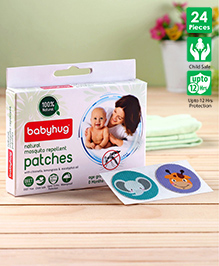
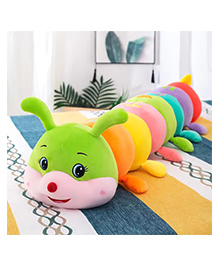
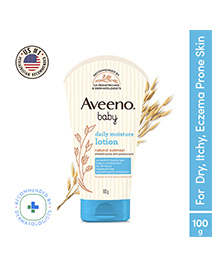
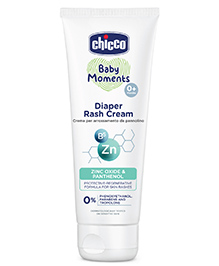
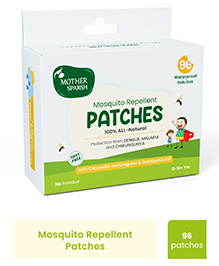
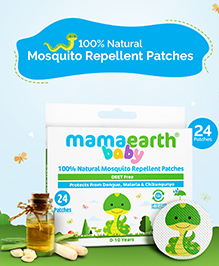
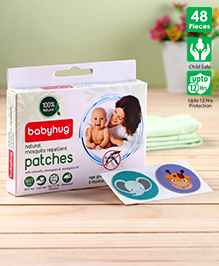
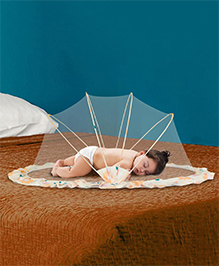
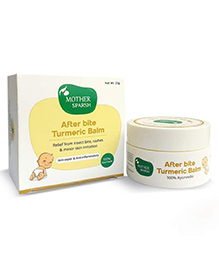
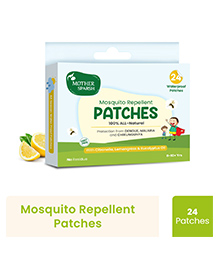

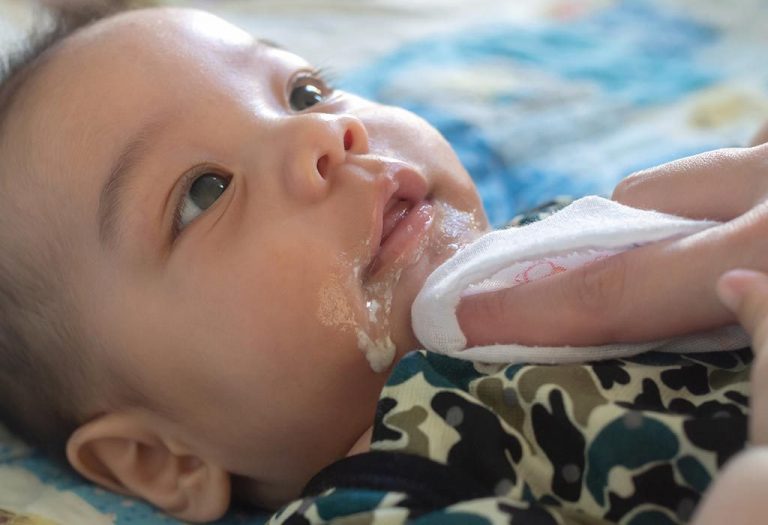
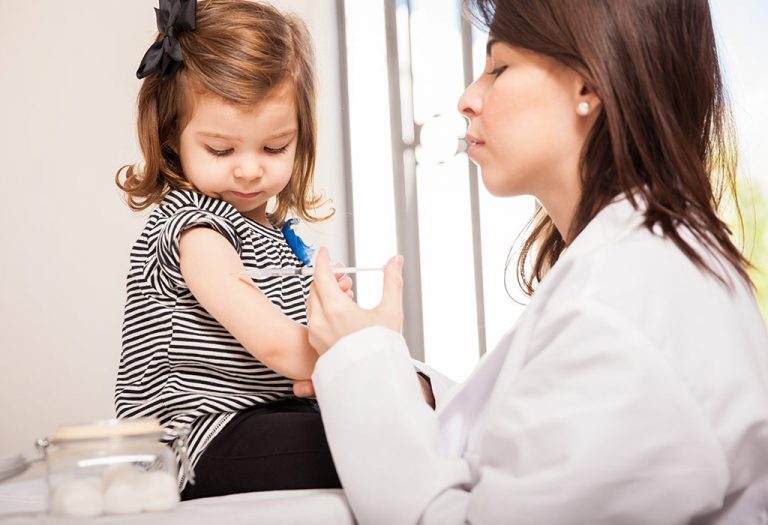


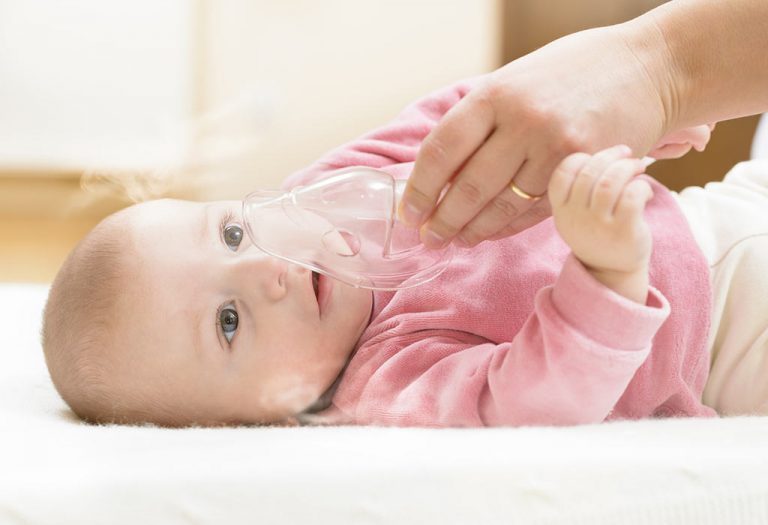

.svg)


















